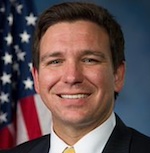 |
| Gov. Ron DeSantis |
Florida’s showboating governor Ron DeSantis is among reasons why trust in America’s political system is on the rocks.
DeSantis signed legislation into law on May 24 that would fine companies such as Twitter and Facebook if they decide to permanently ban political candidates (e.g., Donald Trump) from their platforms.
He claimed to be protecting Sunshine Staters against those "Silicon Valley elites," who have the power to keep the lies and falsehoods spewed by people like Trump from poisoning their sites.
Since when did a US government entity gain the right to control speech on private websites?
The lame-brained law is a gross violation of the First Amendment rights of social media companies to decide how to run their own businesses.
What’s next for DeSantis?
Will he impose fines on the Miami Herald, Sun-Sentinel, Palm Beach Post, Tallahassee Democrat or Mar-a Lago Bugle if they fail to cover his pet issues or preferred candidates.
How is Ron going to get around Section 230 of the Communications Decency Act, which grants liability protection for web platforms?
The gross hypocrisy of DeSantis’ move is evident as his law exempts companies from the fines in the event that they own Walt Disney World or Universal Studios Florida, a property of Comcast.
The courts will strike down DeSantis’ power grab but he did curry favor among the MAGA crowd.
And that’s what it really is all about.
“Perception hacking” is an emerging problem in social media, according to Facebook’s “Threat Report: The State of Influence Operations” released May 26.
Mark Zuckerberg’s firm describes perception hacking as “rather than running actual on-platform campaigns or compromising election systems, they are attempting to garner influence by fostering the perception that they are everywhere, playing on people’s fear of widespread deception itself.”
Facebook found that in the waning hours of the 2018 midterm elections, the Russian Internet Research Agency claimed they were running thousands of fake accounts to sway the vote across the US. It was a Big Lie.
The IRA even created a website with an “election countdown clock,” which tracked the progress of the fake accounts.
Facebook conducted an investigation in conjunction with other tech companies and law enforcement authorities and found only a handful of accounts set up by the IRA.
The effort was all about creating the perception of influence.”
The Report also tackled the “weaponization of uncertainty” in which influencer operations elevate conflicting voices and drive division throughout the world around major crises like the COVID-19 pandemic, critical elections, and civic protests.”
The good news, according to Facebook: “Authentic voices typically outweigh inauthentic attempts to manipulate public debate.”
The bad news: authentic voices are harder to find in today’s highly-partisan and polarized America in which any individual willing to speak out against the party line is shunned and branded as a traitor.
Hello, Liz Cheney.
Good luck in your re-election campaign.


 In tech public relations and beyond, we must remember to put people front and center.
In tech public relations and beyond, we must remember to put people front and center. A shareholder proposal slated for Mondelez International's annual meeting seeks to make sure that the cookie and chocolate company doesn't suffer the same fate as Bud Light after if used transgender influencer Dylan Mulvaney in a marketing effort... Financial services sector slowly regains the public trust that it lost following the global meltdown... China's Baidu cuts ties with PR chief who warned staffers not to run afoul of its work-till-you drop policy.
A shareholder proposal slated for Mondelez International's annual meeting seeks to make sure that the cookie and chocolate company doesn't suffer the same fate as Bud Light after if used transgender influencer Dylan Mulvaney in a marketing effort... Financial services sector slowly regains the public trust that it lost following the global meltdown... China's Baidu cuts ties with PR chief who warned staffers not to run afoul of its work-till-you drop policy. Girl Scouts of Greater New York must rue the day that it signed lease in The Trump Building, home of Donald Trump's post-hush money trial rants... Trump Media & Technology Group says it conducted a "detailed evaluation process" before hiring new auditor, a day before the old one was barred from doing business... Police departments have failed to learn lessons of Black Lives Matter protests, as they have arrested/charged 19 journalists (so far) who were covering Gaza demonstrations.
Girl Scouts of Greater New York must rue the day that it signed lease in The Trump Building, home of Donald Trump's post-hush money trial rants... Trump Media & Technology Group says it conducted a "detailed evaluation process" before hiring new auditor, a day before the old one was barred from doing business... Police departments have failed to learn lessons of Black Lives Matter protests, as they have arrested/charged 19 journalists (so far) who were covering Gaza demonstrations. Democrats play their favorite game, which is bashing Big Oil for its effort to cast doubt on global warming... Wingnut Marjorie Taylor Greene justified her vote against the Antisemitism Awareness Act by sputtering antisemitic nonsense... The deeply politically polarized USA stands united in worries about 2024 election coverage.
Democrats play their favorite game, which is bashing Big Oil for its effort to cast doubt on global warming... Wingnut Marjorie Taylor Greene justified her vote against the Antisemitism Awareness Act by sputtering antisemitic nonsense... The deeply politically polarized USA stands united in worries about 2024 election coverage. What would you do if you have received a call from one of Musk’s few remaining top lieutenants to see if you would be interested in advising him on PR matters?
What would you do if you have received a call from one of Musk’s few remaining top lieutenants to see if you would be interested in advising him on PR matters? 


 Have a comment? Send it to
Have a comment? Send it to 
No comments have been submitted for this story yet.